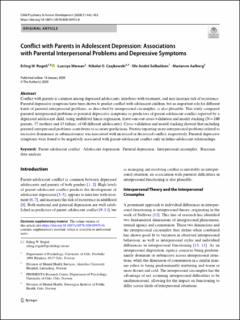| dc.contributor.author | Rognli, Erling Wright | |
| dc.contributor.author | Waraan, Luxsiya | |
| dc.contributor.author | Czajkowski, Nikolai Olavi | |
| dc.contributor.author | Solbakken, Ole Andre | |
| dc.contributor.author | Aalberg, Marianne | |
| dc.date.accessioned | 2023-05-08T10:15:21Z | |
| dc.date.available | 2023-05-08T10:15:21Z | |
| dc.date.created | 2020-01-20T10:20:59Z | |
| dc.date.issued | 2020 | |
| dc.identifier.citation | Child Psychiatry and Human Development. 2020, 51 442-452. | |
| dc.identifier.issn | 0009-398X | |
| dc.identifier.uri | https://hdl.handle.net/11250/3066813 | |
| dc.description.abstract | Conflict with parents is common among depressed adolescents, interferes with treatment, and may increase risk of recurrence. Parental depressive symptoms have been shown to predict conflict with adolescent children, but an important role for different kinds of parental interpersonal problems, as described by interpersonal circumplex, is also plausible. This study compared parental interpersonal problems to parental depressive symptoms as predictors of parent-adolescent conflict reported by a depressed adolescent child, using multilevel linear regression, leave-one-out cross-validation and model stacking (N = 100 parents, 57 mothers and 43 fathers, of 60 different adolescents). Cross-validation and model stacking showed that including parental interpersonal problems contributes to accurate predictions. Parents reporting more interpersonal problems related to excessive dominance or submissiveness was associated with increased or decreased conflict, respectively. Parental depressive symptoms were found to be negatively associated with parent-adolescent conflict only in father-adolescent relationships. | |
| dc.language.iso | eng | |
| dc.title | Conflict with Parents in Adolescent Depression: Associations with Parental Interpersonal Problems and Depressive Symptoms | |
| dc.type | Peer reviewed | |
| dc.type | Journal article | |
| dc.description.version | publishedVersion | |
| dc.subject.nsi | VDP::Klinisk psykologi: 262 | |
| dc.subject.nsi | VDP::Clinical psychology: 262 | |
| dc.source.pagenumber | 442-452 | |
| dc.source.volume | 51 | |
| dc.source.journal | Child Psychiatry and Human Development | |
| dc.identifier.doi | 10.1007/s10578-020-00955-0 | |
| dc.identifier.cristin | 1777286 | |
| dc.relation.project | Norges forskningsråd: 288083 | |
| cristin.ispublished | true | |
| cristin.fulltext | original | |
| cristin.qualitycode | 1 | |
